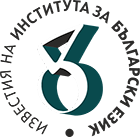QUO VADIS BULGARIAN STUDIES: PROF. MACHIEL KIEL ON BULGARIA AND BULGARIANS. PART II
Maxim Stamenov
Institute for Bulgarian Language, Bulgarian Academy of Sciences
Abstract
Why Bulgarian studies? Each professional in the field has a personal story to tell on the subject. For Bulgarians, it is a matter of definite interest to find out why a foreigner may choose to dedicate their professional life to Bulgaria and Bulgarians instead of many other possible alternatives. In this discussion monograph I look for clues of what may have motivated Prof. Machiel Kiel to undertake research in Bulgarian studies in the Balkan context and later move to Ottoman studies with the orientation toward ‘Bulgaria during the Ottoman period’. Part I of the monograph aimed to identify the leitmotifs in Kiel’s oeuvre and the corresponding intentional stance in dealing with subjects related to Bulgarian studies. Part II is devoted to analyses of specific cases related to the nature of this author’s scientific output, which illustrate his style of thinking and the peculiarities in his way of expression. On this basis, I draw generalizations regarding the problem with the point of view (intentional orientation) of this author, with the perspectives to which he committed himself in the interpretation of Bulgarian history and culture, as well as with the leitmotifs in his work. Against the background of the presented and discussed contributions of Prof. Kiel, I conclude my presentation with an analysis of some of the opportunities that Bulgarian studies offers for the investigation of problems related to the presentation of national history and culture in the first, second and third person perspective in a crosscivilizational (Christianity-Islam) context in historical discourse.
Keywords: Bulgarian studies, Ottoman studies, Balkan studies, intentional stance in historical narrative, perspective in historical narrative, linguistic coding of scientific argumentation, truth-conditions in historical discourse

